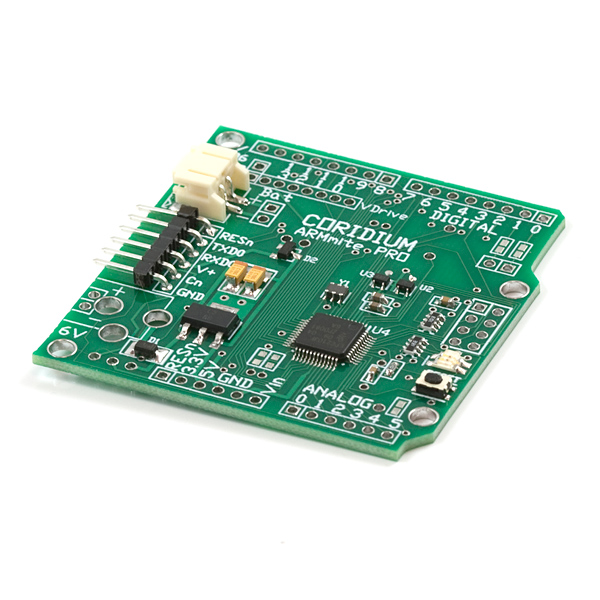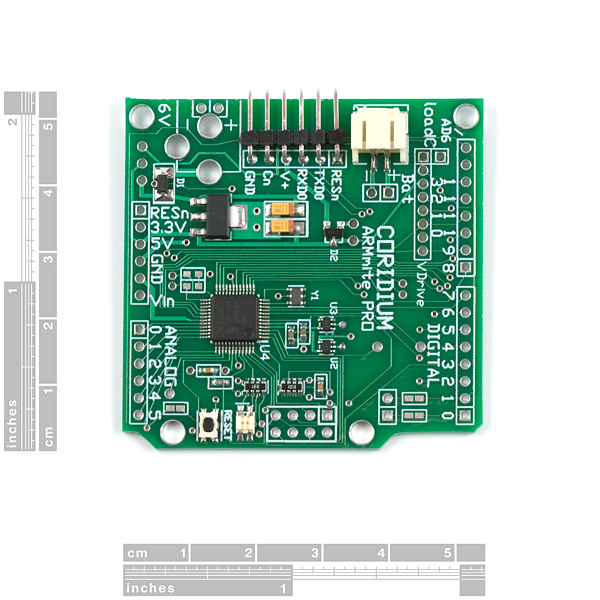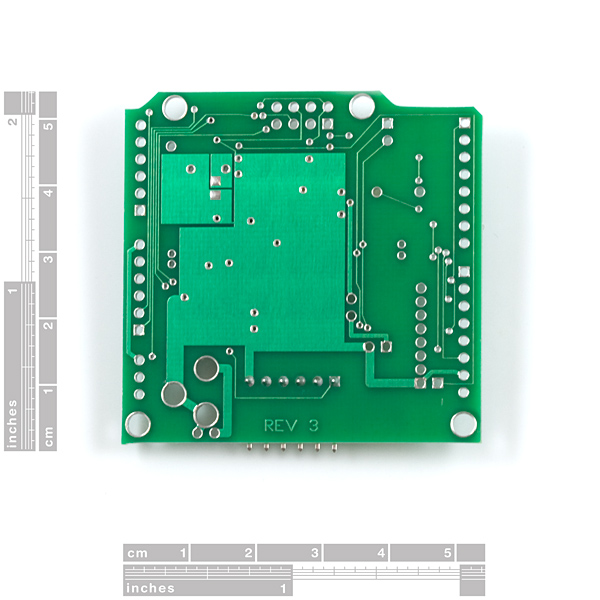ARMmite Pro
Replacement: None. We don't carry a direct replacement for this board, however if you're looking for 32-bit ARM performance in an Arduino compatible form-factor then have a look at the Maple Development Board. This page is for reference only.
A low-cost single board computer solution with an Arduino PRO footprint. Perfect for small volume applications that require customization. Featuring 23 TTL compatible digital I/Os shared with 8 10-bit A/D pins with Zigbee, Bluetooth****or USB optional interfaces. The BASIC compiler is easy to learn, or the pre-configured C compiler is easy to use.
Unleash the power of a 32 bit processor, running at 60 MHz to solve your control problem. Save time with built in support for PWM, SPI, 1-Wire, I2C, Pulse timing, Synchronous and Asynchronous serial protocols.
Digital Inputs and Outputs:
- >1 million IO operations/sec
- SPI support builtin with 800 Kb transfer rate
- I2C support with 200 Kb transfer rate
- SHIFT routines for Sync serial busses at800 Kb rate
- 1-Wire support
- Async SERIAL builtin support upto 115.2 Kb
- Pulse timing and generation with 1 uSec resolution
- Frequency synthesis to 50 kHz
- TTL compatible, 2.4V threshold
- IOs 5V tolerant
- ARM7 CPU running at 60MHz
- BASIC compiler runs >10 million lines of codes/sec
- 32K Flash memory
- 8K SRAM memory
- 23 TTL compatible digital I/O
- 8 10-bit A/D converter channels
- 8 Hardware PWM Channels
- Onboard regulated power supply runs off 5-6V DC input
- Internal supplies of 5V, 3.3V. and 1.8V
Comments
Looking for answers to technical questions?
We welcome your comments and suggestions below. However, if you are looking for solutions to technical questions please see our Technical Assistance page.
Customer Reviews
No reviews yet.




as for whether to get the dev kit or not, if you are using C, our USB dongle controls all the buttons so you don't have to install a jumper when loading a C program.
critical, no, but it does save the hassle after a while.
If you're going to use BASIC, then SparkFun's dongle works just fine, and its cheaper (they build a lot more of them than we do).
IDE doesnt work anymore. Examples wont compile.
Why is the system calling me "madashell?" I'm not mad :-)
I don't give a crap about an IDE, but would appreciate a pointer for developing on linux. Something more helpful than "use gnuarm."
When will you have an IDE running on Ubuntu?
If you're using the supplied BASIC language, you can interact with it through any terminal program. You enter your code by typing out the lines (10 print "hello") or uploading ASCII text. Then you just type "run" to compile and execute it. See the links above for more info.
I was drawn to this board for the high speed clock (60MHz), but after implementation I found a serious flaw: There is no way to do a LOG function with the BASIC software. I ended up approximating a function that I really needed with a polynomial, but the extra hassle caused me to switch to the Arduino.
It is also worth mentioning that there is no on-board PTC fuse like the arduino - I had to blow the 3.3v supply to learn this the first time.
That said, this board has some clever features and does have a very compact footprint.
This board is shipped with a BASIC monitor on it for communication with Coridium's ARMbasic.
Or you can download C tools which are based on WinARM and is preconfigured for this board.
Both are at the link above labeled IDE, which is a zip file with 2 installers called setupC.exe and setupBASIC.exe
I have gotten this board working with WinARM. I wrote blinky using timer0 with interrupts. See http://ieee.ucsd.edu/news/item.php?id=104. To program this board, you will need the USB to serial breakout board. DON'T BUY THE DEVEL KIT!!!
What is needed to program this?
A linux version is not on the schedule, we publish the BASIC compiler natively in linux from time to time. Yagarto is the version of GCC we use, but it doesn't publish a linux installer. GCC should already be running on most linux's, I don't know whether it supports ARM architectures or what needs to be done to get there.
GNUARM hasn't updated in 5 years, so not sure where that is. We're not linux experts, nor do we expect to become that, but we'll help where we can. For most people the VM dujour seems to be the easiest way to go.
Just wanted to report, I compiled a gcc cross compiler, and lpc2k_pgm, on linux from current source code. You have to grab appropriate C startup code and a machine header file from WinARM or somewhere, and then it's pretty painless.
I did run the Coridium software in VirtualBox under linux to initially check out the board and play with it.
Really nifty entry-level board!
this is probably a good place to start
http://arm.com/community/software-enablement/linux.php